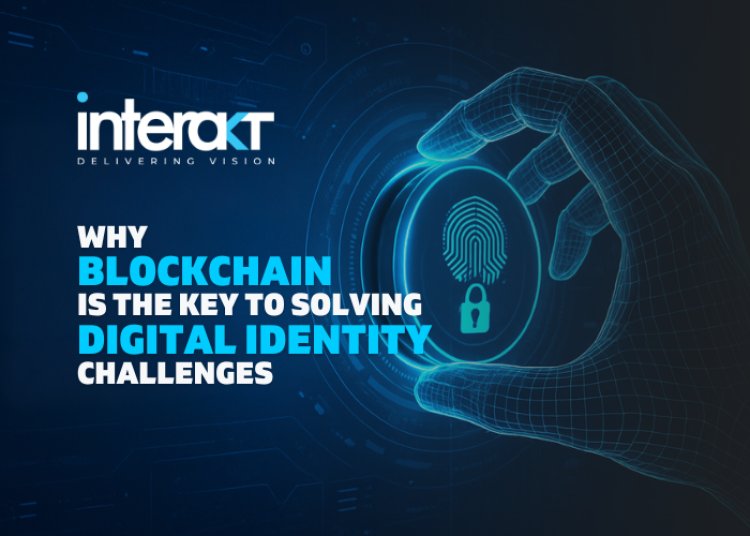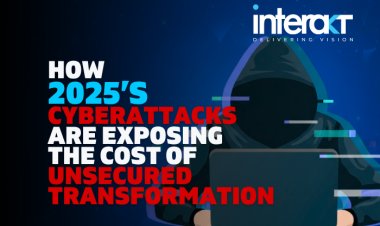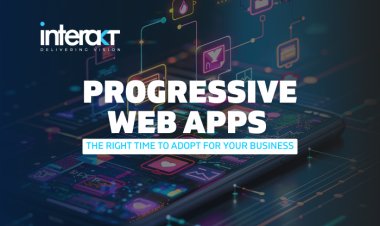Why Blockchain is the Key to Solving Digital Identity Challenges
Discover how blockchain is revolutionizing digital identity. From Self-Sovereign Identity (SSI) to Decentralized Identity (DID), learn how leading enterprises are adopting blockchain to eliminate centralized vulnerabilities, enhance privacy, streamline KYC, and achieve global compliance. Explore real-world use cases in healthcare, fintech, education, and government, and why 67% of Fortune 500 companies are already making the shift. Future-proof your identity strategy with Interakt’s enterprise-grade blockchain solutions.

In our increasingly connected world, digital identity has become the cornerstone of online interactions. From social media profiles to financial transactions, our digital identities are constantly being verified, shared, and sometimes compromised. As cyber threats evolve and data breaches become more sophisticated, traditional identity management systems are struggling to keep pace.
Enter blockchain technology – a revolutionary approach that promises to transform how we think about digital identity security.
What is Digital Identity and Why Does It Matter in 2025?
Digital identity refers to the online representation of an individual or entity, comprising personal data, credentials, and behavioral patterns used for authentication and authorization in digital systems. In 2025, the average person manages over 80 digital accounts, making identity security more critical than ever.
The Current State of Digital Identity: A Landscape of Vulnerabilities
Today's digital identity ecosystem is fragmented and fraught with security challenges. Users typically manage dozens of accounts across different platforms, each requiring separate credentials and storing personal data in centralized databases. This approach creates several critical vulnerabilities:
- Centralized Points of Failure: When companies store user data in centralized databases, they become attractive targets for cybercriminals. A single successful attack can compromise millions of identities simultaneously, as we've seen with major breaches at Equifax, Facebook, and countless other organizations.
- Identity Theft and Fraud: Traditional identity systems rely heavily on static information like Social Security numbers, dates of birth, and addresses. Once this information is compromised, it can be used indefinitely for fraudulent activities.
- Lack of User Control: In most current systems, users have little control over their personal data. Companies collect, store, and share information without meaningful user oversight, leading to privacy concerns and regulatory challenges.
- Inefficient Verification Processes: Verifying identities across different platforms often requires redundant documentation and time-consuming processes, creating friction in user experiences while not necessarily improving security.
Blockchain: A Paradigm Shift in Identity Management
Blockchain technology offers a fundamentally different approach to digital identity management. By leveraging the inherent properties of distributed ledgers – immutability, transparency, and decentralization – blockchain creates new possibilities for secure, user-controlled digital identities.
Decentralized Identity (DID) Architecture
At the heart of blockchain-based identity solutions is the concept of Decentralized Identity (DID). Unlike traditional systems where identity data is stored in centralized databases, DIDs enable users to create and manage their identities independently. Key components include:
- Self-Sovereign Identity (SSI): Users maintain complete control over their identity data, deciding what information to share, with whom, and for how long. This eliminates the need to rely on third-party identity providers.
- Verifiable Credentials: Digital certificates that can be cryptographically verified without contacting the issuing authority. These credentials can represent anything from educational degrees to professional licenses to proof of age.
- Distributed Storage: Identity data is distributed across the blockchain network rather than stored in a single location, eliminating centralized points of failure.
Cryptographic Security
Blockchain identity solutions leverage advanced cryptographic techniques to ensure security and privacy:
- Public-Private Key Cryptography: Each user has a unique pair of cryptographic keys. The private key, known only to the user, serves as their digital signature, while the public key allows others to verify their identity without accessing sensitive information.
- Zero-Knowledge Proofs: These mathematical protocols allow users to prove they possess certain information without revealing the information itself. For example, you could prove you're over 21 without revealing your exact age or date of birth.
- Hash Functions: Sensitive data can be hashed before being stored on the blockchain, ensuring that even if the blockchain is compromised, the original data remains protected.
Real-World Applications and Use Cases
The potential applications for blockchain-based digital identity are vast and transformative across multiple industries:
1. Healthcare
In healthcare, patient identity management is critical for both security and care continuity. Blockchain-based solutions can enable patients to control access to their medical records while ensuring healthcare providers can verify patient identities quickly and securely. Patients could grant temporary access to specialists or emergency responders without compromising their overall privacy.
2. Financial Services
The financial industry has strict Know Your Customer (KYC) and Anti-Money Laundering (AML) requirements. Blockchain identity solutions can streamline these processes by allowing customers to complete verification once and then share verified credentials with multiple financial institutions, reducing redundancy while maintaining security.
3. Education and Professional Credentials
Academic institutions and professional organizations can issue verifiable digital certificates on the blockchain. Graduates and professionals can then share these credentials with employers or other institutions without requiring manual verification processes, reducing fraud and improving efficiency.
4. Supply Chain and Manufacturing
Companies can use blockchain identities to track products and materials throughout the supply chain, ensuring authenticity and preventing counterfeiting. Each product can have a unique digital identity that records its journey from manufacturing to end consumer.
5. Government Services
Governments can leverage blockchain for digital citizenship, voting systems, and public service delivery. Citizens could have secure, verifiable digital identities that enable them to access government services while maintaining privacy and preventing fraud.
Advantages of Blockchain-Based Identity Systems
The benefits of implementing blockchain for digital identity management extend far beyond simple security improvements:
- Enhanced Security and Privacy
Eliminating centralized databases and giving users control over their data significantly reduces the attack surface for cybercriminals. - Improved User Experience
Once established, blockchain identities provide seamless authentication across platforms. No more forgotten passwords or repetitive verification processes. - Reduced Costs and Complexity
Organizations can cut identity management costs, reduce compliance burdens, and automate authentication processes. - Global Interoperability
Blockchain identities can work across borders, platforms, and industries, enabling truly global digital ecosystems. - Transparency and Auditability
Blockchain systems provide transparent audit trails while respecting user privacy, aiding compliance with regulatory requirements.
Challenges and Considerations
Despite its promise, blockchain-based identity management faces several challenges:
- Scalability and Performance
Current blockchains may struggle with global transaction volumes. Layer-2 scaling and efficient consensus algorithms are helping. - Regulatory Compliance
Laws around data protection, privacy, and identity are still evolving. Organizations must align their blockchain initiatives accordingly. - User Adoption and Education
The shift from centralized systems requires significant user education around private key management and digital literacy. - Technical Integration
Integration with legacy systems can be complex. A gradual migration strategy is key. - Key Management
Lost private keys can mean lost identities. Robust backup and recovery mechanisms are critical for system resilience.
The Future of Blockchain Identity
As the technology matures, we can expect to see several trends shaping the future of blockchain-based digital identity:
1. Mainstream Adoption
Major technology companies and governments are beginning to explore and implement blockchain identity solutions. As these early adopters demonstrate success, broader adoption across industries is likely to follow.
2. Improved User Interfaces
The development of more intuitive user interfaces and better key management solutions will make blockchain identities more accessible to mainstream users.
3. Integration with Emerging Technologies
Blockchain identity systems will likely integrate with other emerging technologies like artificial intelligence, Internet of Things (IoT) devices, and augmented reality to create new possibilities for digital interaction.
4. Standardization
Industry standards for blockchain identity are beginning to emerge, which will improve interoperability and accelerate adoption across different platforms and organizations.
5. Enhanced Privacy Features
Continued development of privacy-preserving technologies like zero-knowledge proofs and homomorphic encryption will make blockchain identity systems even more secure and private.
Frequently Asked Questions About Blockchain Digital Identity
What is Decentralized Identity (DID)?
Decentralized Identity (DID) is a blockchain-based identity management approach that allows individuals and organizations to create, own, and control their digital identities without relying on centralized authorities. Unlike traditional systems, DID puts users in complete control of their personal data.
How does Self-Sovereign Identity (SSI) work?
Self-Sovereign Identity (SSI) enables users to store their identity data locally while using blockchain for verification. Users can selectively share verified credentials without exposing unnecessary personal information, enhancing both privacy and security.
What are the main benefits of blockchain identity over traditional systems?
Blockchain identity systems offer enhanced security through decentralization, improved user privacy and control, reduced costs for organizations, global interoperability, and elimination of single points of failure that plague centralized systems.
Which industries benefit most from blockchain identity solutions?
Healthcare, financial services, education, government, and supply chain management see the most significant benefits from blockchain identity implementation due to their strict verification requirements and regulatory compliance needs.
Is blockchain identity technology mature enough for enterprise adoption?
Yes, blockchain identity technology has reached enterprise-grade maturity in 2025, with major implementations across Fortune 500 companies and government agencies worldwide. Leading platforms offer scalable, secure solutions ready for production deployment.
How does blockchain identity ensure privacy?
Blockchain identity uses zero-knowledge proofs, selective disclosure, and cryptographic hashing to ensure that users can prove identity attributes without revealing sensitive personal information, maintaining privacy while enabling verification.
Blockchain vs Traditional Identity Systems: Comprehensive Comparison
Redefining Digital Trust: Why Blockchain Identity Is the New Business Imperative
The future of digital identity is here, and it’s decentralized, secure, and user-centric.
Blockchain technology is not just enhancing how we manage identities; it’s re-architecting the entire trust layer of the internet. By embracing Decentralized Identity (DID) and Self-Sovereign Identity (SSI), organizations can move beyond legacy, breach-prone systems and into an era of true data ownership, privacy by design, and frictionless authentication.
The momentum is real:
- 67% of Fortune 500 companies are piloting or implementing blockchain identity solutions
- The global market is expanding at 85%+ CAGR
- Regulatory frameworks are rapidly evolving to support decentralized models
Yet, this transformation demands more than technology. It requires:
- A strategic roadmap aligned to business goals and compliance mandates
- Thoughtful integration with existing infrastructure
- Intuitive user experience that abstracts blockchain’s complexity
- A cultural shift toward digital trust and transparency
Those who start now won’t just be more secure, they’ll be more agile, more compliant, and more competitive in a digital-first world.
Your Next Step Starts Here: Make Identity Your Competitive Edge
At Interakt, we specialize in building future-ready identity systems powered by blockchain. Whether you're in healthtech, fintech, government, or supply chain, we provide full-spectrum support—from architecture to deployment.
We help you:
- Assess your identity infrastructure and uncover hidden risks
- Design a blockchain-based identity architecture aligned with your needs
- Deploy scalable pilots that demonstrate value fast
- Ensure compliance, privacy, and performance at every step
Email us: info@interakt.co.in | Visit: www.interakttechsol.com | Schedule a session: https://interakttechsol.com/contact












